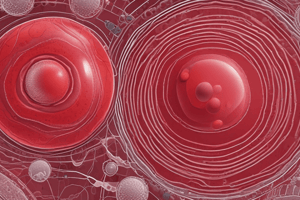Podcast
Questions and Answers
What is the primary focus of this article?
What is the primary focus of this article?
- Exploring physics concepts in biology
- Exploring plant physiology
- Exploring animal behavior
- Exploring cell physiology and blood cell physiology (correct)
Which type of cells transports oxygen and removes carbon dioxide from tissues?
Which type of cells transports oxygen and removes carbon dioxide from tissues?
- Prokaryotic cells
- White blood cells
- Red blood cells (erythrocytes) (correct)
- Platelets
What is the main function of blood in animal physiology?
What is the main function of blood in animal physiology?
- Producing energy for cellular functions
- Removing excess oxygen from tissues
- Storing excess carbon dioxide
- Transporting nutrients and signaling molecules (correct)
What distinguishes eukaryotic cells from prokaryotic cells?
What distinguishes eukaryotic cells from prokaryotic cells?
What is the key role of red blood cells in the body?
What is the key role of red blood cells in the body?
Which type of blood cells are involved in the immune response?
Which type of blood cells are involved in the immune response?
What is the primary function of thrombocytes in the blood?
What is the primary function of thrombocytes in the blood?
Which of the following hormones regulates the process of blood cell formation (hematopoiesis)?
Which of the following hormones regulates the process of blood cell formation (hematopoiesis)?
What determines blood pressure in the body?
What determines blood pressure in the body?
Which of the following blood disorders affects blood clotting ability?
Which of the following blood disorders affects blood clotting ability?
Flashcards are hidden until you start studying
Study Notes
Exploring Cell Physiology and Blood
Cell physiology, the study of how cells function to keep living organisms healthy, is a fundamental aspect of biology. Cells are the basic units of life, carrying out various tasks to maintain life, growth, and homeostasis. One key component of cell physiology that warrants further exploration is the complex system of blood, which is our primary focus in this article.
Cell Physiology
Cells are organized into different types, including prokaryotes and eukaryotes. Eukaryotic cells contain membrane-bound organelles that facilitate specialized functions, such as the production of energy, protein synthesis, and maintaining cellular homeostasis.
Cells communicate with their environment, respond to stimuli, and undergo division to reproduce. They also have the ability to adapt to their surroundings and compensate for damage to ensure their survival. These processes involve a complex interplay between cellular structures and signaling pathways that ultimately contribute to organismal physiology.
Blood
Blood is a vital component of animal physiology, as it circulates through the body, delivering oxygen, nutrients, and signaling molecules to cells and tissues. It also removes waste products and carbon dioxide. Blood is composed of several cell types, including:
- Red blood cells (erythrocytes) – These cells transport oxygen and remove carbon dioxide from the tissues.
- White blood cells (leukocytes) – These cells are involved in the immune response and help defend the body against pathogens.
- Platelets (thrombocytes) – These cell fragments are essential for blood clotting and wound healing.
Hemoglobin, found in red blood cells, binds to and transports oxygen from the lungs to the tissues and carbon dioxide from the tissues to the lungs for exhalation. Thrombocytes play a critical role in blood clotting, which is essential for preventing excessive bleeding. Leukocytes are part of the immune system, which defends the body against infections.
Blood Formation (Hematopoiesis)
Blood cells are formed in the bone marrow, with the red blood cells being produced in the erythropoietic tissue and white blood cells and platelets being produced in the myeloid tissue. Hematopoiesis, the process of blood cell formation, is regulated by various growth factors and hormones.
Blood Circulation and Blood Pressure
Blood circulation is maintained by the heart, which pumps blood through the body via a system of blood vessels. Blood pressure, which is the force applied by the blood against the walls of blood vessels, is essential for maintaining blood flow and organ perfusion. Blood pressure is determined by the heart's pumping ability, blood volume, and blood vessel elasticity.
Blood Disorders and Diseases
Blood disorders and diseases include anemia, thrombocytopenia, leukopenia, and hemophilia, all of which have an impact on blood composition or function. In some cases, blood transfusions and medications are used to manage these conditions.
In conclusion, cell physiology and blood are deeply interconnected, with blood being a critical component of cellular physiology. Understanding these processes helps us better comprehend the intricacies of life and provides valuable insights into disease development and treatment.
Studying That Suits You
Use AI to generate personalized quizzes and flashcards to suit your learning preferences.




